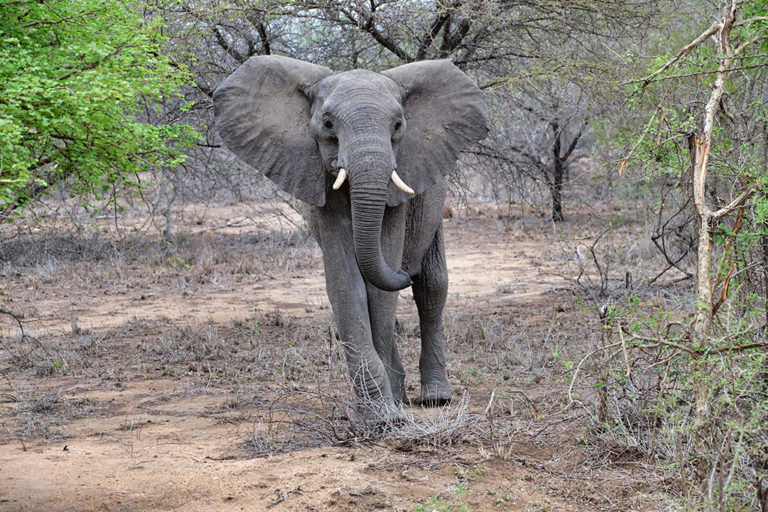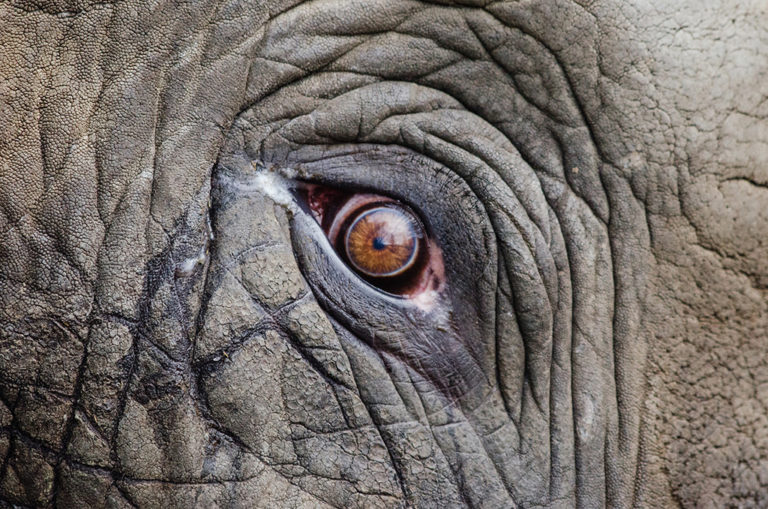Balule Associated Nature Reserve has justified the killing of a young elephant bull in front of tourists as an ‘act of self-defense’, backtracking on an original announcement condemning the act and ignoring eye-witness accounts.
Balule Nature Reserve is a protected area in Limpopo Province, South Africa which forms part of the Greater Kruger National Park as a member of the Associated Private Nature Reserve.
The young elephant bull was shot 13 times in front of four eye-witnesses standing on a viewing deck overlooking Balule’s Maseke Game Reserve, where the hunt took place.
Balule’s Hunting Incident Report states that “the elephant charged [the hunting party]and they shot it when it was five meters from them.”
However, the hunters were never in any danger, says Annelize Slabbert, one of the four onlookers who witnessed the shooting.

Young elephant. Image credit: Unsplash
She says guests at the lodge saw the whole incident from their unobstructed vantage point.
Her husband, Gerard, affirms this. “After the first shot, I saw the three men standing by their vehicle in the road; the elephant was 80 to 100 meters away from them and starting running in the opposite direction.”
The Slabberts also say the elephant never charged the hunting party. According to Annelize, “it was calmly feeding on a tree when the first shot rang out. The elephant then gave a loud cry and ran for cover in the thicket, with the hunters running in pursuit, firing more shots. Thirteen shots later, after the elephant had fallen in a ditch in an attempt to escape the hunters, its shrieks ceased.”
Later, a TLB, tractor and trailer had to be called in to retrieve the carcass from the deep ditch, the hunting report confirms.
“It is something I will, unfortunately, never forget,” Annelize says. “It was heartbreaking.”
Balule management has vehemently rejected any claims of alcohol use, but the final report states that one member of the hunting party, Sean Nielsen did, in fact, ‘mess his whiskey’ on one of the witnesses who had approached the hunting party after the incident. The report reads that “a heated exchange took place between the witness and Mr Nielson.”
Photographs taken on the scene show Nielsen, the long-term lessee of Maseke Game Reserve, with a glass of tawny liquid in hand. He reportedly acted as the reserve representative on the hunt.
The photographs, Balule chairperson Sharon Haussmann argues, were taken after the shooting and are, therefore, not indicative of a breach of any ethical or general hunting protocols.
Change of tune
When the incident occurred on 23 November last year, Haussmann initiated a full investigation and said that the parties involved would be held accountable. She labelled the incident as “completely unethical and inconsiderate and a huge embarrassment for Balule.” She said “it did not comply with the sustainable utilization model of ethical hunting in accordance with the hunting protocol that governs all reserves within APNR and to which Balule and hence Maseke are bound.”
The full investigation report was shared in full in Febraury this year. The outcome painted an entirely different picture.
Haussmann backtracked on her initial statement and said that “according to the APNR protocol there were no ethical transgressions.
“We don’t approve that it happened in front of a lodge, but unfortunately, the lay of the land was such that it was in view of a lodge,” Haussmann said in January. The full investigation concludes that “besides poor site selection, there is no evidence of ethical breaches that can be actioned by us.”
When asked about the contradicting statements between Balule’s final report and the witness reports sent in as part of the investigation, Haussmann said it was a case of ‘he said, she said’.
“I wasn’t there. I wish I was; then I could tell you for sure [what happened],” she said. The report simply concludes that there’s no reason to doubt the “version put forward by the ‘hunting party”.

Elephant up close. Source: Pixaby
Hunting continues
Kruger National Park’s managing executive Glenn Phillips also previously condemned the hunt and said SANParks was “keenly awaiting the finalisation of the [Balule] investigation”. When questioned on the outcome of the investigation, no further comment was received.
The increasing number of questionable hunting incidents occurring in the Kruger’s adjoining reserves underscores the growing conflict between hunting and photographic safaris operating on the same land in the Assosiated Private Nature Reserves (APNRs).
While this conflict ensues in meetings regarding protocol and ethics, poaching in the park is on the rise and Kruger’s elephants are caught in a dangerous gap between licensed and unlicensed killers.
Kruger recently launched a campaign aimed at fighting elephant poaching in the park’s northern region, however, Balule was given approval by the Mpumalanga Tourism and Parks Agency (MTPA) to hunt 22 elephants during the 2019/2020 hunting season, which begins on 1 April. This amounts to nearly half of the 47 elephants permitted to be hunted in all the APNRs this season.
In the previous year, a total of 53 elephants were legally hunted in the APNR, while 71 elephants were poached in the Kruger Park.
Author: Louzel Lombard Steyn Source: Conservation Action Trust
You may also like
Related Posts
China’s National Health Commission has published a list of controversial coronavirus treatments that have animal...
read more
Warmer sea temperatures in the summer months, especially in February, were recorded and are believed...
read more
While people are stuck indoors due to the coronavirus pandemic, the penguins at the Two...
read more